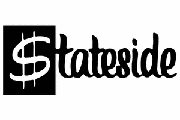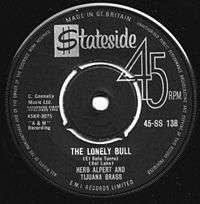Stateside Records
| Stateside Records | |
|---|---|
 | |
| Parent company |
|
| Founded | 1962 |
| Founder | Fred Oxon |
| Distributor(s) | Parlophone |
| Genre | Various |
| Country of origin | UK |
| Official website |
www |

Stateside ($tateside) Records is a British record label which initially released licensed American recordings and is now a reissue label.
It was formed in 1962 by EMI as a replacement for the Top Rank label (originally the Rank Organisation's label), which had folded. EMI hired former Top Rank label head Fred Oxon to run it and compete with Decca's London "American Recordings", and Pye's "Pye International" labels.
While Top Rank's British acts (such as John Leyton) were assigned to EMI's Columbia and HMV labels, Stateside continued to issue records from its American suppliers, including Amy, Bell, 20th Century Fox, Scepter, Vee-Jay and A&M, and acquired Tamla-Motown-Gordy from Oriole Records.
Its first hit was "Palisades Park" by Freddy Cannon, which was licensed from Swan Records. It was through EMI's relationship with Vee-Jay and Swan that pre-1964 recordings by the Beatles were released by those labels in the USA when EMI's American subsidiary Capitol turned them down.
Stateside's black label design, with a large '45' for singles and a coloured logo for albums, was the model for the new-look Columbia, Parlophone and HMV labels which were introduced the following year.
In the late 1960s, when EMI set up long term licence contracts with US labels like Motown, MCA and Asylum, it no longer needed Stateside, and the label retired quietly in 1973 (along with the EMI Columbia]] and HMV POP labels) in favour of the new EMI label.
Stateside has retrospectively attracted interest from northern soul fans, mainly for its role in passing on American Motown recordings to the UK market. Stateside issued 45 of these prior to the establishment of the UK Tamla Motown label, including the number 1 "Baby Love" in 1964.
In the 1980s, the Stateside label was revived as a catalogue reissue label specialising in American recordings from Capitol Records and other labels EMI acquired over the years. The trademark is now owned by Parlophone Records Limited, as a consequence of the EU-mandated divestiture of some EMI Records assets to Warner Music Group. That forced the deletion of titles whose ownership remained with Capitol Records which is now owned by Universal Music Group.